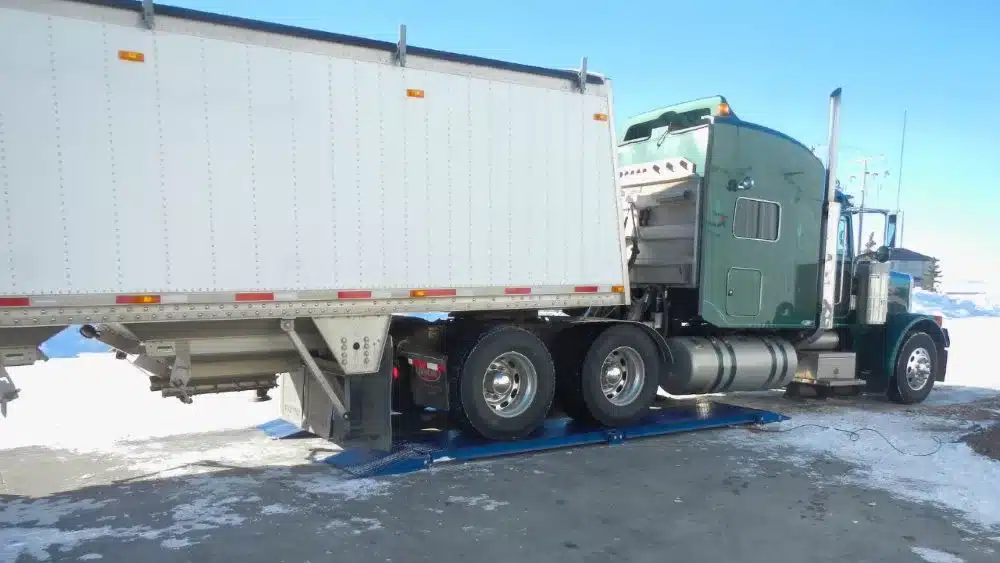 March 13, 2024
March 13, 2024
If you are in the transportation business, dealing with the delicate balance between efficiency and accuracy is part of your day-to-day routine. You already know the critical role truck axle scales play in ensuring your operations run smoothly.
But with the many options available, from static to dynamic axle scales, how do you choose the right one for your operation?
Join us as we delve into truck scales and understand the differences between static and dynamic axle scales.
The Foundation of Load Capacity Management: What Are Axle Scales?
At their core, axle scales are designed to measure the weight of a vehicle’s load. Whether you’re transporting grain, livestock, or equipment, these scales ensure that your vehicles are within legal weight limits, preventing fines and reducing wear on your vehicles.
Static Axle Scales: Precision When You Need It
Static axle scales are best suited for scenarios requiring the highest degree of accuracy. Vehicles come to a complete stop on the scale, making these scales ideal for operations where each load’s precise weight needs to be documented.
For farms and companies focused on transporting high-value goods or those that need detailed records for inventory and sales, the investment in static scales pays off in the long run through unparalleled accuracy.
Check out this testimonial where a client tells how much money a static farm truck scale helped him save:
Dynamic Axle Scales: Keep It Moving
What is dynamic weighing? On the flip side, dynamic axle scales cater to the need for speed. These scales allow for weighing on the move for busy operations where vehicles are constantly coming and going.
While they may not match the pinpoint accuracy of their static counterparts, dynamic scales offer a compelling trade-off: increased throughput and operational efficiency.
They’re Incredibly Valuable in Situations Where Time is of the Essence, Such As:
- In bustling warehouse environments
- For companies handling perishable goods
- When meeting tight shipping schedules
- For companies dealing with high volumes of waste collection
What Is the Difference Between Static Weight and Dynamic Weight?
Choosing between static and dynamic portable axle scales involves balancing accuracy, efficiency, and cost. Static scales are more accurate but require vehicles to stop, potentially slowing down operations.
Although slightly less precise, dynamic scales keep things moving and reduce bottlenecks, so your choice should align with your operational priorities. Dynamic weighing can be further divided into speed categories: Slow speed weighing (~5-10 mph) and highway speed.
Static scales are the way to go for businesses where every pound counts towards profitability. Consider dynamic scales if your operation values speed and efficiency to meet demands and accuracy is less important.
Maximizing ROI: What to Consider
Implementing the right truck axle scale system can lead to significant cost savings and operational improvements.
Here Are Key Considerations For Maximizing Your Dynamic or Static Weighing Scale Investment:
- Accuracy vs. Speed: Determine what’s more critical for your operation. Precise weight measurements can optimize billing and inventory.
- Regulatory Compliance: Ensure your chosen system meets local regulations to avoid fines and penalties.
- Cost of Ownership: Consider the purchase price and installation, maintenance, and potential downtime costs.
FAQs: Navigating the World of Axle Scales
How Does an Axle Scale Work?
An axle scale measures a vehicle’s weight using load cells under its axle or wheel, then displays the weight for compliance and inventory management in transportation and logistics.
How Accurate Are Axle Scales?
Static scales offer near-perfect accuracy, while dynamic scales are slightly less precise but still within acceptable margins for most applications.
What is a Dynamic Axle Weigher?
A dynamic axle weigher is a type of scale that measures the weight of a vehicle as it moves across the scale platform. It’s the opposite of a static axle weigher, where the truck must stop on the platform to be measured.
What do Different Axle Ratios Mean?
Axle ratios refer to the gear ratio in the vehicle’s differential. They impact its towing capacity and fuel efficiency, which are not directly related to portable axle scales but are important for vehicle performance.
Whether you opt for the precision of static scales or the efficiency of dynamic ones, one thing remains clear: investing in the right axle scale system can spell the difference between costly fines and seamless operations.
By understanding the intricacies of truck axle scales and considering factors like accuracy, speed, and regulatory compliance, you can increase profitability and streamline processes.
So, what are you waiting for? Take the leap, choose wisely, and watch as your business scales new heights of success.
Massload’s Portable Truck Axle Scales Are a Must-Have
Looking to optimize your trucking operations and maximize profitability? Look no further than Massload’s Truck Scales.
But don’t just take our word for it – our satisfied clients have spoken, sharing how our scales have saved them substantial sums of money:
Contact our experts today, and let us guide you towards the ideal choice for your business. We have the expertise to help you make a decision you won’t regret.


